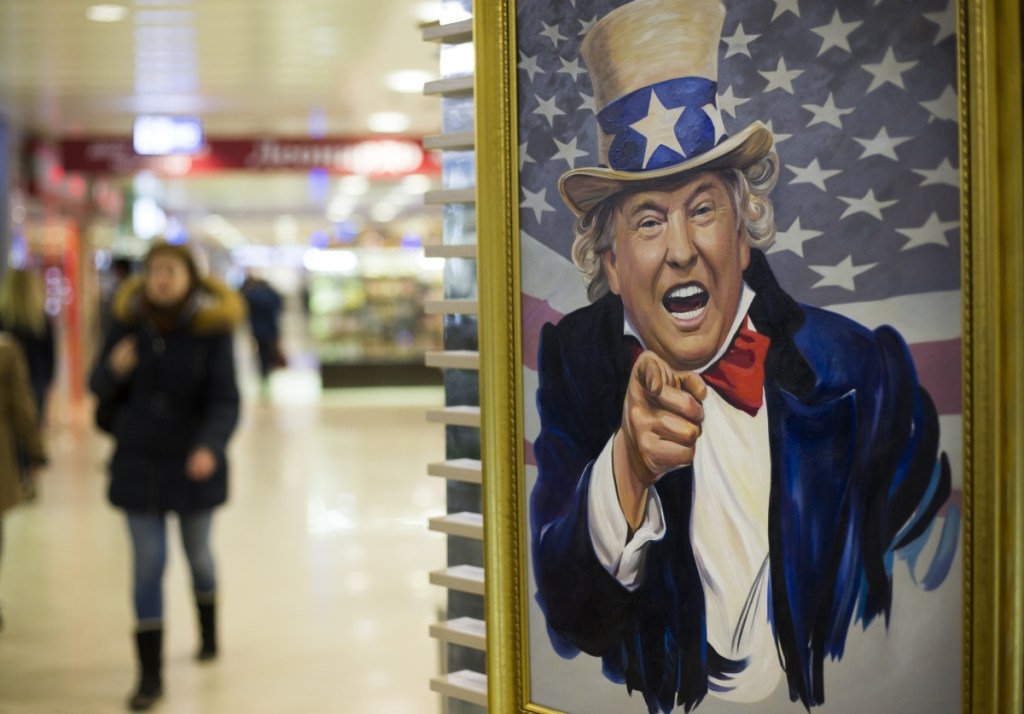PARIS — President Trump is finally making moves against foreign election meddling – and Russia says it couldn’t care less.
Trump’s executive order this week authorizing sanctions on foreigners who mess with American elections could herald new headaches for Moscow.
But Russian officialdom shrugged it off as internal U.S. politicking, and analysts say it would barely bruise Russia’s economy and do little to deter interference in November’s midterms – since Russia denies meddling, anyway.
A Russian PR agent who runs a provocative U.S. website says the executive order isn’t denting his resolve to expand in the next few months.
“There’s such a huge quantity of sanctions, everyone’s getting them confused,” said Alexander Malkevich, editor of news site USAReally, which is funded by the sponsors of the Russian “troll factory” accused of interference in the 2016 U.S. vote.
“We are not planning to do agitation or propaganda for one candidate (in the midterms) or another,” Malkevich said.
However, he said the site will focus on coverage of immigration, and policies that he says coddle immigrants. He displays Trump paraphernalia in his Moscow office, and harbors deep disdain for Democrats.
A series of sanctions on Russian officials, oligarchs and companies by the U.S. has progressively deepened Russian resentment, and Russians see Trump’s new order as further reducing any remaining chances for detente.
“It’s about how we can build any kind of partnership, including on those issues where it is still potentially possible,” Russian senator Oleg Morozov, who sits on the foreign affairs committee, told news agency RIA Novosti after Trump signed the sanctions order Wednesday.
“This window of opportunity is turning into a little slit.”
Trump’s order came amid bipartisan criticism of his refusal to confront Putin at a joint news conference in Helsinki in July about accusations of Russian hacking, trolling and manipulation during the 2016 presidential campaign.
With a sweeping investigation underway into what Russia did and whether it colluded with the Trump campaign, the White House has imposed some sanctions against Russia and expelled Russian spies.
But domestic critics say Trump isn’t going far enough.
His new order authorizes sanctions against any individual, company or country that interferes with things like voter databases or tabulation equipment; it also targets activities such as distributing disinformation or propaganda to influence or damage confidence in U.S. elections.
In theory, it could be used to punish those meddling in the midterms. U.S. intelligence officials say they’re not now seeing the intensity of Russian intervention registered in 2016 but are particularly concerned about potential midterm-related activity by Russia, China, Iran and North Korea.
Microsoft said it uncovered new Russian hacking efforts targeting U.S. political groups ahead of the November vote. Google warned a senator that he might have been the target of hackers tied to a “nation-state.”
And Facebook recently banned hundreds of pages, groups or accounts linked to Russia and Iran for misleading political behavior.
Trump’s executive order is vague and doesn’t name any particular target, however.
“It’s rather lightweight,” said independent Russian political scientist Dmitry Oreshkin. “It doesn’t bring a serious blow to Putin’s position.”
If Russia does have a structure in place to interfere in the midterms, Oreshkin said the executive order could prompt this structure to “create an extra layer of isolation to ensure that it will be very hard to follow the path (of hacking or disinformation) to its source.”
Russia’s leaders are more worried about heavier sanctions already in place over Moscow’s interference abroad – and the potential for more. Some speculate that Trump’s order was aimed not at scaring Russia but at deflating support for broader sanctions under discussion in Congress.
A bill by Republican and Democratic senators would target entire economic sectors of a country that interferes with elections, and prohibit foreign governments from purchasing election ads or using social media to spread false information.
Separately, the U.S. energy secretary, visiting Moscow this week, threatened energy-related sanctions on Russia that could do deep damage to the oil- and gas-rich country.
Analyst Chris Weafer of consultancy Macro-Advisory said Trump’s election meddling sanctions would be too narrow to have much economic impact and would not “themselves cause a crisis in Russia.”
However, he said, the “salami-slice approach” of increasing layers of sanctions reinforces the perception of risk, particularly for foreign companies.
“As the sanctions get tougher, what we see is companies are delaying investment decisions.”
Send questions/comments to the editors.



Success. Please wait for the page to reload. If the page does not reload within 5 seconds, please refresh the page.
Enter your email and password to access comments.
Hi, to comment on stories you must . This profile is in addition to your subscription and website login.
Already have a commenting profile? .
Invalid username/password.
Please check your email to confirm and complete your registration.
Only subscribers are eligible to post comments. Please subscribe or login first for digital access. Here’s why.
Use the form below to reset your password. When you've submitted your account email, we will send an email with a reset code.